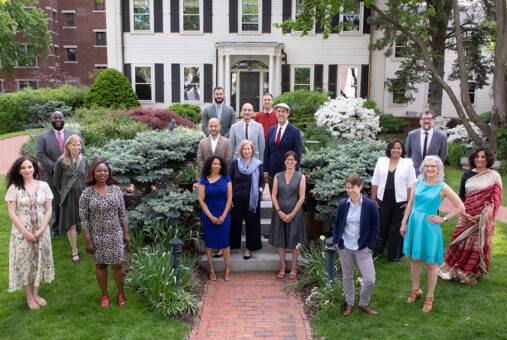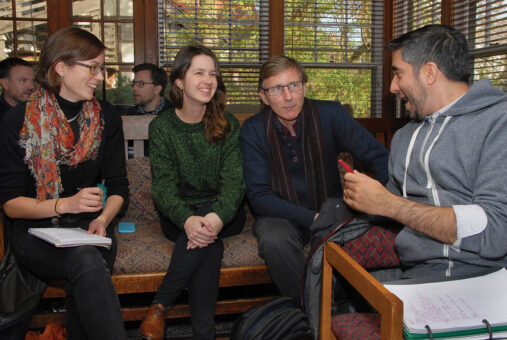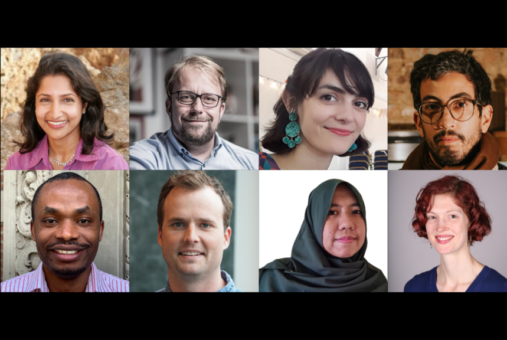This time of year marks the opening of calls for grants and fellowships in Europe and the U.S. Participation in these programs appears on the resumes of many of Latin America's most successful journalists. Because of this, these opportunities are among the most coveted experiences possible for press professionals to advance their careers.
They vary from sabbatical years dedicated to leisure and reflection, to online mentorships for long-form reporting, to intensive study projects. In general, they are offered by universities, think tanks and non-governmental organizations based in the United States and Europe.
Many of the recipients describe the experiences as transformative, both professionally and personally. A former student of the Knight Wallace Fellowship in Michigan, Brazilian journalist Maurício Meireles, now a senior reporter for Folha de S. Paulo, for example, said that the program helped him create a network of friends that goes beyond professional practice.
"You have a good chance of making lifelong friends there. I was suspicious when I saw colleagues talking about the program as something with transformative potential, but that's how it is," Meirelles told LatAm Journalism Review (LJR).
As in previous years, we have selected a list of fellowships available now or that are opening soon to Latin American journalists, along with an overview of application processes and deadlines. Other selection processes that have not yet announced deadlines, such as the Reuters Institute fellowship at Oxford University, have not been included.
Opportunities range from those for journalists with established careers to those who are still at the start of their paths Some fellowships are being offered for the first time, and others have been around for decades. Not all programs accept applications from all countries in the region, and some include criteria such as age, or minimum or maximum time of experience.
The opportunities listed below are in order of their application deadlines, from the earliest to the farthest on the horizon. Anyone wishing to apply is advised to visit the programs' own websites, where all details are available.
To celebrate its 20th anniversary next year, the Environmental Journalism Network (EJN) has launched a new one-year program for journalists, with the aim of improving coverage of four priority areas linked to the environment: climate change, biodiversity, oceans, and integrated health (One Health).
The reporting fellowship is open to professional journalists from low- or middle-income countries -– which includes the vast majority in the region – with at least five years' experience. There are four open positions, and applications from freelancers are encouraged.
Among the benefits of the new program, EJN fellows will receive quarterly payments of 6,000 euros (US $6,400); they will receive an additional 6,000 euros to attend conferences and write feature stories; they will participate in an orientation workshop organized by the EJN to improve their reporting skills and meet other participating fellows; and they will receive mentoring from experienced journalists specialized in each subject area, providing individual guidance, resources for reporters and editorial support for their stories.
Fellows must dedicate at least two days a week to the fellowship activities, which may include, but are not limited to, producing stories, attending workshops and other training activities. Fellows are expected to produce complex and ambitious stories over the course of the program, with a minimum of six stories published over the course of a year.
For more information, visit this website.
The Rest & Resilience Fellowship is a joint initiative of Reporters Without Borders and the taz Panter Foundation, in close cooperation with the German newspaper tageszeitung (taz). It has been offered annually since 2015 and is aimed at journalists from countries with restrictions on freedom of the press and information.
Participants live in Berlin for six months. Benefits include airfare, a furnished apartment, a monthly allowance of 1,000 euros (US $1,068), and health insurance. In addition, the time in Berlin offers opportunities for exchange with international journalists from all over the world, knowledge of German newsrooms, language lessons, and the option of individual psychological counseling, if desired.
The main objective is to expand their personal and professional horizon, and the fellowship works like a sabbatical - journalists are not expected to work nor are required to do anything else, and can devote themselves to any activity they prefer. At the end of their stay, fellows are expected to return to their home countries. Applications are encouraged from experienced journalists whose work takes a critical stance — taz is known for being a left-leaning newspaper — and is socially engaged.
Although it is aimed at those facing constraints, applications are not accepted from professionals in exile. According to the call “Applications from journalists who are unable to return to their home country due to the political situation or their own threat situation can unfortunately not be considered for the application process. This is mainly due to the fact that no visa will be issued by German authorities without a possibility of return.”
For more information, visit this website.
This is not so much a fellowship as a training program in which participants are tasked with producing three ambitious stories on energy transition in Latin America.
Topics include fossil fuels and renewable energies, whether through public policies, lobbying, energy projects, finance, socio-environmental conflicts, among other areas, and each participant receives $250 per story.
For the production of texts, there is personalized editorial support from the Climate Tracker team, as well as financial incentives, mentoring from leading journalists in the region, and interaction with other journalists. Once selected, fellows have to take part in group learning sessions led by the program team.
The opportunity is open to journalists from Argentina, Chile, Colombia, Brazil, Mexico, Peru, the Dominican Republic, and Venezuela.
For more information, visit this website.
Journalists have competed for Kiplinger Fellowships since 1973. In recent years, hundreds of journalists from all over the world have applied each year for a number of spots ranging from 20 to 25, distributed among American journalists and those from other countries.
Kiplinger Fellows typically spend a week in April at Ohio University's main campus in Athens, Ohio, where they can engage with and learn from great professors and experts in the field. The next edition takes place from April 14 to 20, and the fellowship includes accommodation, most travel costs, most meals, and free training.
The next edition will focus on reporting on migration issues. You must have at least five years' experience in the field to apply.
For more information, visit this website.
This is one of the most prestigious fellowships for journalists in the world. Journalists selected for Nieman Fellowships spend two full semesters at Harvard University in Cambridge, Massachusetts, attending classes there and at other local universities. They have great flexibility to set their own schedules and attend seminars, lectures, masterclasses, and journalism conferences.
"The idea of the Nieman Fellowship is to give mid-career journalists a gap year, so fellows have a lot of freedom to choose what to do. There are people who take the opportunity to advance book projects, others take music lessons, and others take the writing courses Nieman offers," Claudia Antunes, a 2005-2006 fellow who is now a senior reporter for Sumaúma, a journalism site focused on the Amazon, told LJR.

Nieman Fellows of the 2021 cohort at Harvard University (Photo: Nieman Foundation/Courtesy)
"I took advantage of the opportunity to study international politics and political science, and one of the most unforgettable was Professor Jane Mansbridge's course at the Kennedy School. As it is a region with many universities and research centers linked to them, time is short for the many options for debate on contemporary issues," Antunes added.
Hundreds of candidates from all over the world apply every year and few Latin Americans are selected. Even so, many professionals from the region have passed through the program. Among those chosen in recent years are Venezuelan Patricia Laya (2022), Colombian Jorge Caraballo Cordovez (2022), Brazilian Natalia Viana (2022), Chilean Miguel Paz (2015), and Cuban Elaine Díaz Rodríguez (2015).
Registration requires, among other things, samples of recent work, study plans, and three letters of recommendation. The selection of intellectuals circulating at Harvard with whom the fellows can interact is stellar.
"For example, Eric Hobsbawm was there at the time for a packed lecture, and we could attend classes by Amartya Sen. Chomsky also talked to the fellows at Nieman House," Antunes said. "In addition to classes and lectures, the best thing about the fellowship is interacting with other fellows, both American and from elsewhere. My group keeps in touch to this day through a WhatsApp group."
For more information, visit this website.
This is another extremely competitive and prestigious fellowship, based at the University of Michigan. The Knight-Wallace Fellowship is intended to offer journalists two much-desired assets: free time and resources. For the eight-month program, up to 20 journalists receive a grant of US $85,000, plus US $5,000 for moving expenses.
Areas of focus may include, but are not limited to, honing professional skills, addressing challenges faced by their newsroom, analyzing data and doing research for a long-term reporting project or developing a journalistic venture.

A podcast workshop during the Knight-Wallace Fellowship (Photo: Knight-Wallace/Courtesy)
"Among similar programs in the United States, which are not many, this is certainly one of the best for those who need something increasingly rare in a journalist’s routine — time," said Meireles, from Folha de S. Paulo.
"To begin with, there is the space to dedicate yourself to a project, with access to University of Michigan resources and support from the program. Ideal for journalists who need a break to plan the next step in their career," he added.
Meireles highlights yet another aspect: "The Knight-Wallace Fellowship has a profound humanist perspective," he said. "It's a program concerned with giving us space not only to create and produce, but also to rest and contemplate, practice a hobby, make friends or cook with friends."
The professionals chosen usually come from many different areas of journalism.
For more information, visit this website.
From September to June, the prestigious JSK fellows take time off from their full-time professional duties to work on projects aimed at developing solutions to pressing problems in contemporary journalism.
This is a working fellowship: anyone wishing to apply for it should know that if they are lucky enough to be chosen, they will need to roll up their sleeves. When applying, you need to describe a research topic, always linked to innovations that solve current challenges in the field.
"A candidate needs to know if this program is the one they’re looking for. It's not a sabbatical program, quite the opposite. You work hard, you have to devote yourself a lot to the topic you're trying to find solutions for," Guilherme Amado, a Brazilian columnist for Metrópoles, who took part in the program in 2018, told LJR.
Amado notes that the program is also for mid-career journalists with at least seven years of professional experience. In his group, he was the second youngest, while the oldest member was 56.
"You have to be at the right point in your career. It's not a program for journalists at the start of their careers or with little experience. Even those seven years need to have been substantial," he said.
It's not all hard work, though: while studying, the fellows enjoy a range of opportunities available to members of the Stanford University community in Northern California, an hour's train ride from San Francisco.
For more information, visit this website.
Experienced investigative journalists with a proven track record covering the Amazon are encouraged to apply for the reporting fellowship offered by the Rainforest Investigations Network (RIN), an initiative of the Pulitzer Center.
Reporters from outside these regions can also participate, provided they focus their work on stories related to the Amazon, the Congo Basin or Southeast Asia.
The goal of the fellowship is to promote collaboration among journalists to unveil the intricate web of financial interests, illegal practices and legal gaps that enable large-scale deforestation.
Leading the Rainforest Investigations Network is journalist Gustavo Faleiros, a respected reporter covering the Amazon and the founder of data journalism site InfoAmazonia.
The year-long fellowships will not only cover the reporter's salary, but also provide support to the host news outlet (if the journalist is a freelancer) or the employing media organization. This year, RIN is particularly keen on cross-border investigations, emphasizing collaboration among different newsrooms and countries.
In addition, two fellowships are reserved for projects centered on transparency and governance issues. These investigations will go beyond traditional forest reporting, delving into the intricate financial structures that drive environmental damage and unsustainable supply chains.
Professionals selected for these fellowships will receive training, data access, communication support, and coordination assistance from the Pulitzer Center. This marks the fourth cohort of RIN investigative fellows since the initiative's inception in late 2020.
For more information, visit this website.
The Fellowship at Auschwitz for the Study of Professional Ethics (FASPE) is an intensive two-week study program in professional ethics and ethical leadership.
Each year, the program awards fellowships to 14 to 16 journalism students and budding journalists from different parts of the world, whether they are graduate students or journalists who graduated no more than 10 years ago. The fellows spend two weeks in Berlin and Poland, where they visit key sites in Nazi history and take part in daily seminars led by expert professors.
The program is not intended to be a Holocaust studies course, nor a genocide prevention program. Instead, the curriculum is designed to challenge fellows to critically examine contemporary issues and events that raise ethical concerns in their daily lives. The role of journalism and how to avoid normalizing politically aberrant behavior are some of the training topics.
More than 800 alumni make up the program's network.
For more information, visit this website.
This is another highly prestigious program, which annually offers support to journalists around the world dedicated to covering topics related to science, health, technology, and the environment. Journalists from all countries compete on equal terms and are encouraged to apply.
Those chosen live in the Boston/Cambridge area during the MIT academic year, which runs from mid-August to May. Fellows receive a stipend of US $85,000, paid in installments over 10 months, as well as a moving allowance and health insurance for the family.

THe eight Knight Science Journalism fellows for the 2022-23 Fellowship Class (Photo: Knight Science Journalism/Courtesy)
Scholars are expected to take at least one science-related course per quarter, but apart from that, there is a great deal of flexibility. The program also organizes social activities, from welcome parties to holiday celebrations, to form a sense of community.
Recent Latin American participants include Thiago Medaglia (Brazil; 2019-2020), Iván Carrillo Pérez (Mexico; 2016-2017), Federico Kukso (Argentina; 2015-2016), Oriana Fernández (Chile; 2014-2015), Giovana Girardi (Brazil ; 2014-2015), and Pablo Correa (Colombia; 2012-2013).
Applications for the 2024-2025 Knight Science Journalism Fellowships only open on Nov. 15, 2023, and close on Jan. 15, 2024.
For more information, visit this website.
Every year, the World Press Institute (WPI) takes ten journalists from around the world to the United States to get a first-hand look at political life in the country, meet leading journalists, and learn about U.S. media business models.
Over the course of nine weeks, fellows travel around the country, visiting newsrooms of several of the world's biggest newspapers, and many of the most interesting American cities. In its next edition, visits will include cities such as New York, Miami, Washington, Chicago, Austin, San Francisco, and Los Angeles, with tours of major journalistic, government, and civil society institutions on the itinerary.
The stipend includes accommodation, travel, food, and health care. Applications do not open until Dec. 1. To be eligible, candidates must have more than five years' experience in the media, be fluent in English, and have leadership potential. They are also asked to submit letters of recommendation and work samples.
For more information, visit this website.
(Banner photo credit: InSapphoWeTrus - CC Attribution 2.0)